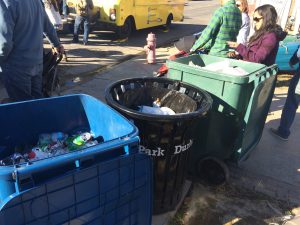|
|
Food Trucks, Waste, and Economic OpportunityBy Jeffrey HughesPublished January 27, 2015How do you turn a small urban park into a massive culinary festival? Invite 45 food trucks to show up for the afternoon. Planning a sunny 50 degree day after a week of rain helps as well. “Food truck rodeos” have become a popular way of bringing people into urban areas to support small businesses and food creations that often rely on local products. The crowds that come for these events pump excitement and financial resources into urban areas, but they also lead to some less exciting by-products such as trash. At one time, the main objective for festival organizers in dealing with waste was to do it as quickly and sublimely as possible — spreading waste bins throughout. Many event organizers have started to rethink this approach and there has been a rapid increase in no and zero waste events. Environmental festivals like the Eno River Festival have long sought to minimize their environmental impact, but this trend has not been limited to environmental events. Mainstream events such as the NC State Fair and Sports Events have realized that with a little extra effort on their part, the waste system can be redesigned to reduce the event’s environmental impact. The Food Truck Aficionados that attended last week’s Rodeo in Durham had two important choices — the first was what tasty meal to have and the second was what to do with what their waste when they were through. A soda can, paper plate and scraps put into a trash bin would begin an epic journey from trash bin to trash truck ultimately traveling to a faraway landfill. The same material put into a recycling bin and compost bin would be picked up and processed locally. How did the 6,000 foodies attending Durham’s Food Truck Rodeo do? For every one bin of trash that was sent to a landfill, 4 bins were collected for recycling and composting. Low waste events have led to new and expanded economic opportunities for entrepreneurs throughout the state. Companies such as Food FWD and Brooks Composting have built businesses based on dealing with waste in new ways. Brooks Composting, a small business in rural Chatham County began 20 years ago primarily as an agricultural composting entity and now receives urban waste from throughout the state that is converted to soil amendments. Promoting these types of activities allow local governments to support economic development and reduce environmental impact at the same time. |
Published January 27, 2015 By Jeffrey Hughes

How do you turn a small urban park into a massive culinary festival? Invite 45 food trucks to show up for the afternoon. Planning a sunny 50 degree day after a week of rain helps as well. “Food truck rodeos” have become a popular way of bringing people into urban areas to support small businesses and food creations that often rely on local products. The crowds that come for these events pump excitement and financial resources into urban areas, but they also lead to some less exciting by-products such as trash. At one time, the main objective for festival organizers in dealing with waste was to do it as quickly and sublimely as possible — spreading waste bins throughout. Many event organizers have started to rethink this approach and there has been a rapid increase in no and zero waste events. Environmental festivals like the Eno River Festival have long sought to minimize their environmental impact, but this trend has not been limited to environmental events. Mainstream events such as the NC State Fair and Sports Events have realized that with a little extra effort on their part, the waste system can be redesigned to reduce the event’s environmental impact.
The Food Truck Aficionados that attended last week’s Rodeo in Durham had two important choices — the first was what tasty meal to have and the second was what to do with what their waste when they were through. A soda can, paper plate and scraps put into a trash bin would begin an epic journey from trash bin to trash truck ultimately traveling to a faraway landfill. The same material put into a recycling bin and compost bin would be picked up and processed locally. How did the 6,000 foodies attending Durham’s Food Truck Rodeo do? For every one bin of trash that was sent to a landfill, 4 bins were collected for recycling and composting.
Low waste events have led to new and expanded economic opportunities for entrepreneurs throughout the state. Companies such as Food FWD and Brooks Composting have built businesses based on dealing with waste in new ways. Brooks Composting, a small business in rural Chatham County began 20 years ago primarily as an agricultural composting entity and now receives urban waste from throughout the state that is converted to soil amendments. Promoting these types of activities allow local governments to support economic development and reduce environmental impact at the same time.
Author(s)
Tagged Under
This blog post is published and posted online by the School of Government to address issues of interest to government officials. This blog post is for educational and informational Copyright ©️ 2009 to present School of Government at the University of North Carolina. All rights reserved. use and may be used for those purposes without permission by providing acknowledgment of its source. Use of this blog post for commercial purposes is prohibited. To browse a complete catalog of School of Government publications, please visit the School’s website at www.sog.unc.edu or contact the Bookstore, School of Government, CB# 3330 Knapp-Sanders Building, UNC Chapel Hill, Chapel Hill, NC 27599-3330; e-mail sales@sog.unc.edu; telephone 919.966.4119; or fax 919.962.2707.

